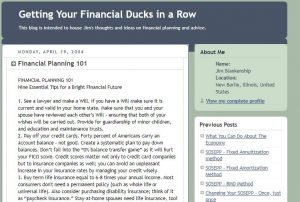
On this date fifteen years ago, April 19, 2004, this blog was officially launched. The article below was the first post ever, and I’ve reposted it here in celebration of the 15 year anniversary of Financial Ducks In A Row.
I have not edited the content below, it’s exactly the same as it was originally posted back in 2004.
A lot has changed over the years, and I continue to enjoy sharing sound financial principles, information and advice through this medium, and I hope to keep it up for a long time into the future.
Nine Essential Tips for a Bright Financial Future
1. See a lawyer and make a Will. If you have a Will make sure it is current and valid in your home state. Make sure that you and your spouse have reviewed each other’s Will – ensuring that both of your wishes will be carried out. Provide for guardianship of minor children, and education and maintenance trusts.
2. Pay off your credit cards. Forty percent of Americans carry an account balance – not good. Create a systematic plan to pay down balances. Don’t fall into the “0% balance transfer game” as it will hurt your FICO score. Credit scores matter not only to credit card companies but to insurance companies as well; you can avoid an unpleasant increase in your insurance rates by managing your credit wisely.
3. Buy term life insurance equal to 6-8 times your annual income. Most consumers don’t need a permanent policy (such as whole life or universal life). Also consider purchasing disability insurance; think of it as “paycheck insurance.” Stay-at-home spouses need life insurance, too! Note: Each family’s needs are different. Some families have a need for other kinds of life insurance, so you should review your situation carefully with an insurance professional or two before making decisions in this area.
4. Build a 3 to 6 month emergency fund. Establish a home equity line of credit before you need it – this can take the place of part of your emergency fund.
5. Don’t count on social security! Fund your IRA each and every year. If you don’t fund it annually, you lose the opportunity. Fund a Roth IRA over a traditional IRA if you qualify.
6. If offered, contribute to your 401(k), 403(b) or other employer-sponsored saving plan. Use your company’s flex spending plan to leverage tax advantages. If you don’t use your flex plan or fund your retirement plan annually, you lose the opportunity – and the tax advantages – for that year.
7. Buy a home if you can afford it. Maintain it properly. Build equity in your property. You’ll have much more to show for your money spent than a box full of rental receipts!
8. Use broad market stock index funds and direct purchase government bonds to reduce risk, minimize costs and diversify your portfolio. If you have limited options, for example in your 401(k) plan, make sure that you diversify across a broad spectrum of options. Don’t over-weight in any one security, especially your employer’s stock – remember ENRON?
If you are unsure about your financial affairs or you have financial goals such as retirement planning, college funding, business succession or estate planning that you’d like help achieving, call Blankenship Financial Planning at 217/488-6473 to schedule a no-cost, no-obligation “Get Acquainted” meeting to discuss your situation.


 Sterling Raskie, MSFS, CFP®, ChFC®
Sterling Raskie, MSFS, CFP®, ChFC® The latest in our Owner’s Manual series, A 401(k) Owner’s Manual, was published in January 2020 and is available on
The latest in our Owner’s Manual series, A 401(k) Owner’s Manual, was published in January 2020 and is available on  A Medicare Owner’s Manual, is updated with 2020 facts and figures. This manual is available on
A Medicare Owner’s Manual, is updated with 2020 facts and figures. This manual is available on  Social Security for the Suddenly Single can be found on Amazon at
Social Security for the Suddenly Single can be found on Amazon at  Sterling’s first book, Lose Weight Save Money, can be
Sterling’s first book, Lose Weight Save Money, can be  An IRA Owner’s Manual, 2nd Edition is available for purchase on Amazon. Click the link to choose the
An IRA Owner’s Manual, 2nd Edition is available for purchase on Amazon. Click the link to choose the  Jim’s book – A Social Security Owner’s Manual, is now available on Amazon. Click this link for the
Jim’s book – A Social Security Owner’s Manual, is now available on Amazon. Click this link for the  And if you’ve come here to learn about queuing waterfowl, I apologize for the confusion. You may want to discuss your question with Lester, my loyal watchduck and self-proclaimed “advisor’s advisor”.
And if you’ve come here to learn about queuing waterfowl, I apologize for the confusion. You may want to discuss your question with Lester, my loyal watchduck and self-proclaimed “advisor’s advisor”.
Congrats on reaching such a wonderful milestone!! :)
Thank you, Tom. Never dreamed it would still be going after 15 years!